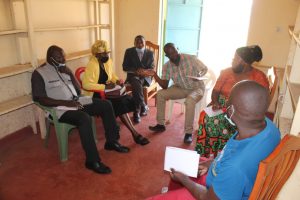
18/11/2021 at the Magrib hall,
Kakamega County.
This is one amongst the many projects that are being carried out under the Joint Initiative for Strategic Religious Action (JISRA), which seeks to promote peaceful and just societies where all enjoy Freedom of Religion and Belief (FoRB).
The inter-religious dialogue meetings were carried out between minority and mainstream religious groups, to get to understand each other’s point of view and work towards accommodating and tolerating religious diversity. The participants were drawn from small African Christian independent formations and mainstream religious institutions which included Pentecostals, Catholics and Islam.
Amongst issues discussed, the following two issues stood out.
1. Hate speech and Incitement.
Hate speech distorts understandings of social forces, spreads misinformation, and aggravates prejudice and discrimination. It affects power dynamics, creating rifts and mobilizing groups in ways that divide communities. During the dialogue it emerged that religious leaders and faith-based organizations have a role to play in preventing incitement and hate speech, reducing tensions in the communities. From the dialogue discussion the participants commitment to better engage religious institutions in countering hate speech and incitement to violence was underscored. The session explored both actual and potential ways in which religious leaders can provide alternative narratives and engage with their respective congregations in respectful discourse. Major emphasis was put in use of active non-violence as a key strategy in addressing hate speech and incitement.
2. Empowerment of women, youth and vulnerable people
It explored how religious communities are collaborating with other stakeholders to develop and implement policies that promote equality of opportunity, especially for underserved groups. Equal opportunities for all will allow for a thriving society. However, persistent social and economic inequalities between men and women continue to shape the reality in education, economic independence, health provision and security. Religious communities and institutions are influential partners when it comes to shaping these areas and need to take a leading role in ensuring enhanced empowerment of women, youth and vulnerable people within the faith community and in collaboration with others.
The empowerment of the youth, women and vulnerable people (people living with disability, old persons) in the community is critical since these groups of people sometimes influence key decisions in the community. Everyone should be able to live in dignity and therefore that core human value should not be taken away from them.
Let us all work together to support and empower the disadvantaged groups in our societies. Do not turn a blind eye to their cry or plea, remember, the little you have can change someone’s life immensely.
 Chemchemi ya Ukweli
Chemchemi ya Ukweli